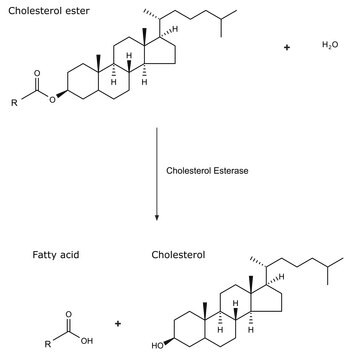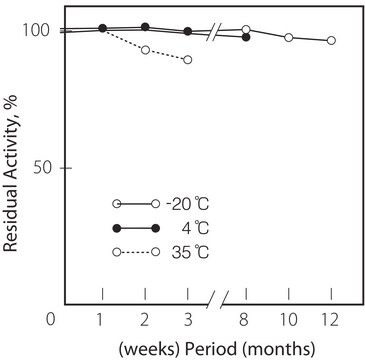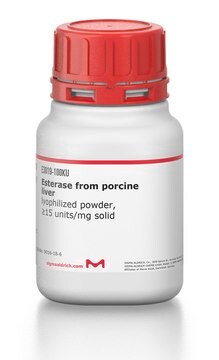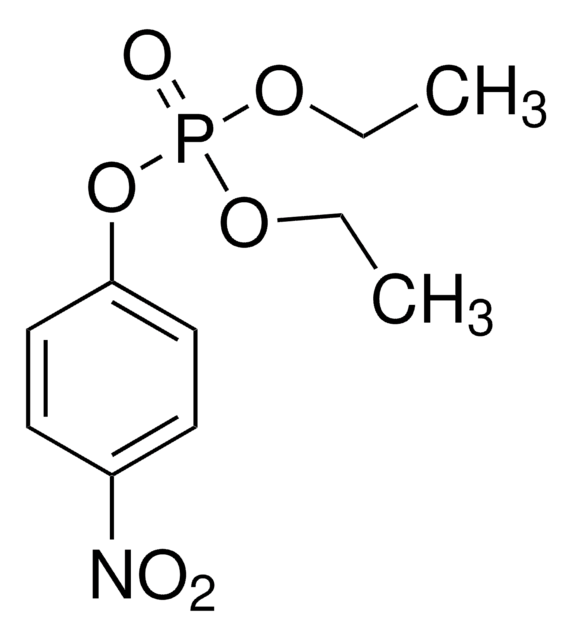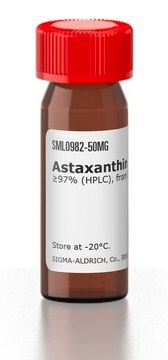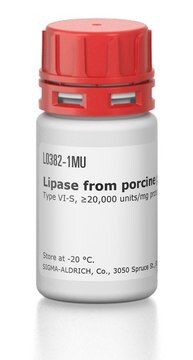おすすめの製品
詳細
Research area: Cell signaling
Pancreatic cholesterol esterase (CEase), also known as bile salt stimulated lipase, is a serine hydrolase belonging to the α/β hydrolase family of enzymes. They are released from the exocrine pancreas. Serine 194, histidine 435 and aspartate 320 represent the catalytic triad of the enzyme.
Pancreatic cholesterol esterase (CEase), also known as bile salt stimulated lipase, is a serine hydrolase belonging to the α/β hydrolase family of enzymes. They are released from the exocrine pancreas. Serine 194, histidine 435 and aspartate 320 represent the catalytic triad of the enzyme.
アプリケーション
Cholesterol Esterase from porcine pancreas has been used:
- in an in vitro simulated digestion model to improve the hydrolysis of carotenoid esters in the intestinal phase
- to analyze the bioavailability of phytosterol and cholesterol in the aqueous micellar phase of an in vitro simulated digestion model
- as a standard in enzyme activity assay
生物化学的/生理学的作用
Cholesterol esterase (CEase), an enzyme having broad substrate specificity plays a key role in regulating the bile salt mediated hydrolysis of dietary cholesteryl esters. It also participates in the hydrolysis of triglycerides and phospholipids which are essential for normal cholesterol absorption. Cholesterol esterase hydrolysis helps in the determination of total cholesterol levels in the serum and plasma. Additionally, cholesterol esterase (CEase) along with phospholipase A2 is involved in the hydrolysis of lecithin to lysolecithin, forming intestinal micelles that deliver free cholesterol to enterocytes. Loss of enzyme function results in reduced intestinal absorption of dietary cholesteryl esters and prevents the formation of intestinal micelles, thereby failing to deliver cholesterol efficiently. Circulating cholesterol esterases, accumulated in atherosclerotic lesions are involved in triggering the proliferation of smooth muscle cells. Lastly, they are also selectively involved in the hydrolysis/condensation of carboxylic ester bonds.
単位の定義
1 Uは、pH 7.0、37°C、1分間で、1 μmolのコレステロールを遊離させる酵素量に相当します(酢酸コレステロールを基質とした場合)。
その他情報
Sales restrictions may apply
シグナルワード
Danger
危険有害性情報
危険有害性の分類
Resp. Sens. 1
保管分類コード
11 - Combustible Solids
WGK
WGK 1
引火点(°F)
Not applicable
引火点(℃)
Not applicable
個人用保護具 (PPE)
Eyeshields, Gloves, type N95 (US)
適用法令
試験研究用途を考慮した関連法令を主に挙げております。化学物質以外については、一部の情報のみ提供しています。 製品を安全かつ合法的に使用することは、使用者の義務です。最新情報により修正される場合があります。WEBの反映には時間を要することがあるため、適宜SDSをご参照ください。
Jan Code
26745-BULK-F:
26745-100MG-F:
26745-10MG-F:
26745-VAR-F:
試験成績書(COA)
製品のロット番号・バッチ番号を入力して、試験成績書(COA) を検索できます。ロット番号・バッチ番号は、製品ラベルに「Lot」または「Batch」に続いて記載されています。
この製品を見ている人はこちらもチェック
Baojian Li et al.
European journal of medicinal chemistry, 45(5), 1955-1963 (2010-02-13)
Due to the importance of pancreatic cholesterol esterase (CEase) as a potential target in atherosclerosis and for the development of hypocholesterolemic agents, there are increasing interests in designing and synthesizing CEase inhibitors. In the present study, we prepared forty-five isocoumarin
R.J. Kazlauskas
Journal of the American Chemical Society, 111, 4953-4953 (1989)
J. Siedel et al.
Methods of Enzymatic Analysis, 8, 139-139 (1985)
Ömer Şahin et al.
Journal of biomolecular structure & dynamics, 1-15 (2021-01-23)
In this work, Combining coumarin and thiazole with 3-tertiary butyl salicylaldehyde into in a single molecule, new Schiff base (CTS), and its metal complexes with palladium and platinum were synthesized and characterized by using well-known spectroscopic techniques such as 1H-NMR
Kevin R Shreder et al.
Bioorganic & medicinal chemistry letters, 22(17), 5748-5751 (2012-08-11)
KIAA1363 is a serine hydrolase whose activity has been shown to be positively associated with tumor cell invasiveness. Thus, inhibitors of KIAA1363 represent a novel targeted therapy approach towards cancer. AX11890 ((1-bromo-2-naphthyl) N,N-dimethylcarbamate) was identified as a KIAA1363 inhibitor with
ライフサイエンス、有機合成、材料科学、クロマトグラフィー、分析など、あらゆる分野の研究に経験のあるメンバーがおります。.
製品に関するお問い合わせはこちら(テクニカルサービス)

